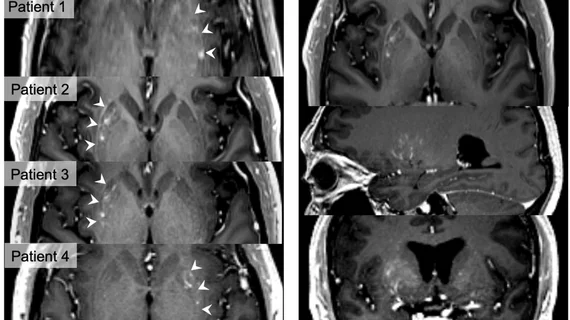MRI-guided focused ultrasound an effective tool in the fight against Parkinson's disease
New research is offering hope for the future in the fight against Parkinson’s disease, opening the door for a new method of delivering treatment to patients suffering from the devastating neurodegenerative disorder.[1]
Published in Movement Disorders, the research highlights how experts were able to penetrate the blood-brain barrier by using microbubble-mediated magnetic resonance–guided focused ultrasound (MRgFUS). In doing so, researchers were able to target a specific area of the brain—the putamen—to deliver therapeutic treatment.
While the blood-brain barrier protects the brain from toxins, it also makes it difficult for therapeutic medications to reach their intended destination, rendering them ineffective. Penetrating this barrier with targeted sound waves via focused ultrasound can temporarily give clinicians access to deliver treatment.
This most recent study is not the first example of focused ultrasound being utilized to breach the blood-brain barrier; however, it is the first time its efficacy has been tested in the treatment of Parkinson’s disease.
“Our early findings are an exciting and critical first step in less invasive direct-to-brain delivery of therapeutics to key areas of the brain important in the development and progression of Parkinson’s disease,” Nir Lipsman, MD, the study’s co-principal investigator and director of Sunnybrook’s Harquail Center for Neuromodulation, said in a statement.
Although the first phase of the trial’s sample size was small—just four patients with early-stage Parkinson’s disease—the results offer “much needed progress” in the treatment of PD, experts involved in the study suggested.
With the help of focused ultrasound, researchers delivered three doses of a therapeutic medication every two weeks to each patient. After follow-ups at three and six months following the procedure, experts reported that the patients’ Blinded Movement Disorder Society–Unified Parkinson's Disease Rating Scale motor scores decreased by 12% at 6 months.
“It is still very early in the research, but with our first-in-the-world study findings, we are making much needed progress in the development of innovative treatments for people with Parkinson’s disease,” Lorraine Kalia, MD, PhD, co-principal investigator and a neurologist and senior scientist at the Krembil Brain Institute, said in a statement about the work.
A Phase I/II clinical trial is currently underway to further explore the effectiveness of MRI-guided focused ultrasound in delivering treatment for PD.
Learn more here.

